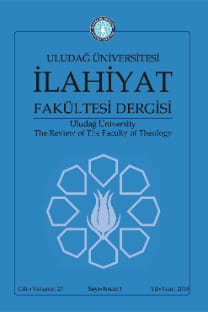Bilimsel Sosyal Bilim İdealinin Açmazları: Bir Hermenötik Açılım Teklifi
Pozitivist epistemolojik geleneği pozitivist kılan önemli ilkelerden biri metot birliği tezidir. Bu ilkeye göre doğa bilimleri ile beşeri/sosyal bilimler arasında metodolojik bir ayrışmaya gitmeyi gerektirecek ciddi bir fark yoktur. Dolayısıyla sosyal bilimcilerce yürütülen her türlü araştırma sonuçlarının geçerli olabilmesi için doğa bilimlerinde kullanılan metotların genel karakteri ile örtüşmesi gerekir. Bilimde pozitivist geleneğin zayıfladığı söylenebilirse de söz konusu ilkenin etkilerini sosyal bilimlerin neredeyse her alanında görmek mümkündür. Bu makalenin amacı sosyal bilimcilerin bilimsel olma iddialarının nasıl da moda bir felsefi söylemin dayatmalarının sonucu olarak ortaya çıktığının bir analizini sunmaktır. Makalenin temel tezi ise şudur: Sosyal bilimciler, genelde pozitivizmin, özelde de mantıksal pozitivizmin derinliklerinde yatan bir imgeyi reddetmeyi amaçlarken, esasen bilginin imkanını doğa bilimlerinin ulaştığı sonuçlarla sınırlı tutan ve tümüyle pozitivistik (positivistic) bir bilgi anlayışının kriter ve yöntemleriyle uyuşma şartına bağlayarak bu hedeflerinden sapmışlardır. Bu ise sosyal bilimcilerin hala pozitivist geleneğin etkisi altında olduğunun bir kanıtı niteliğindedir
Anahtar Kelimeler:
Pozitivizm, Mantıksal Pozitivizm, Paradigma, Paradigma Değişimi, Metot
Bilimsel Sosyal Bilim İdealinin Açmazları: Bir Hermenötik Açılım Teklifi
-
Keywords:
-,
___
- Bernstein, Richard J. The Restructuring of Social and Political Theory. Philadelphia: University of Pennsylvania Press, 1978.
- Bryant, Christopher G. A., Positivism in Social Theory and Research: Theoretical Traditions in the Social Sciences. London: Macmillan Publishers Ltd. 1985.
- Chafetz, Janet S., A Primer on the Construction and Testing Theories in Sociology. Itasca, Ill.: F.E. Peacock, 1978.
- Durkheim, E. The Rules of Sociological Method. New York: The Free Press, 1982.
- Eckberg, D. L. - L. Hill, Jr., “The Paradigm Concept and Sociology: A Critical Reviw,” Paradigms and Revolution içinde, ed. G. Gutting. Notre Dame, Ind.: University of Notre Dame Press, 1980.
- Friedrichs, Robert W. A Sociology of Sociology. New York: Free Press, 1970.
- Gadamer Hans-Georg. Wahrheit und Methode: Grundzüge eine rphilosophischen hermeneutik, 5th ed. Tübingen: J.B. Mohr, 1986. İngilizce tercümesi, Truth and Method, 2nd rev. ed. Joel Weinsheimer and Donald G. Marshall. New York: Crossroad, 1989.
- Giddens, A. New Rules of Sociological Method A Positive Critique of Interpretive Sociologies. London: Hutchinson, 1976.
- Hempel, Carl. Aspects of Scientific Explanation. New York: The Free Press, 1965.
- Kuhn, Thomas. The Structure of Scientific Revolutions, 2d ed. Chicago: University of Chicago Press, 1970.
- --------.“The Essential Tension,” The Essential Tension: Selected Studies in Scientific Tradition and Change (Chicago: University of Chicago Press, 1977.
- ---------.“Second Thoughts on Paradigms,” The Structure of Scientific Theories içinde, 2d ed., ed P. Suppes Urbana: University of Illinois Press, 1977.
- ----------.“The Function of Measurement in Modern Physical Science”, The Essential Tension: Selected Studies in Scientific Tradition and Change. Chicago: University of Chicago Press, 1977.
- Martins, Herminio. “The Kuhnian ‘Revolution’ and Its Implications for Sociology,” Imagination and Precision in the Social Sciences içinde, ed. T.J. Nossiter, A.H. Hanson ve S. Rokan. London: Faber&Faber, 1972.
- Merton, Robert. On Theoretical Sociology. New York: The Free Press, 1967.
- Ritzer, George. Sociology: A Multiple Paradigm Science. Boston: Allyn & Bacon, 1975.
- Watson, Robert I. “Psychology: A Prescriptive Science,” American Psychologist 22 (Haziran 1967).
- Weber, Max. Basic Concepts in Sociology. New York: Greenwood Press, 1969.
- ISSN: 1301-3394
- Yayın Aralığı: Yılda 2 Sayı
- Yayıncı: -
Sayıdaki Diğer Makaleler
Kırgızistan: Dinlerin Müsabaka Alanı
Diglossia’ya Rağmen Yetkinleşme: Arapça’ya Yeni Bir Yaklaşım
Karin C. Ryding, Hasan Taşdelen
Muhammed Murtazâ ez-Zebîdî’nin Nübüvvet Anlayışı
Onbirinci Yüzyılda Siyasal Gerçeklik ve İslâm Siyaset Düşüncesine Etkisi
H. Kübra Yücedoğru, Vejdi Bilgin
“Künye Defterleri”ne Göre İstanbul İmam ve Hatip Mektebi (1924-1930)
Câhiliye Şiiri Üzerine Şaban Karataş
Fıkhî Hadislerin Rivayet Değeri Bağlamında “Beyyine ve Yemin Hadisi”nin Tahric ve Tenkidi
